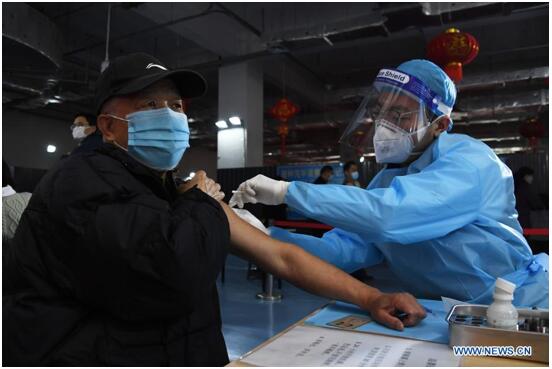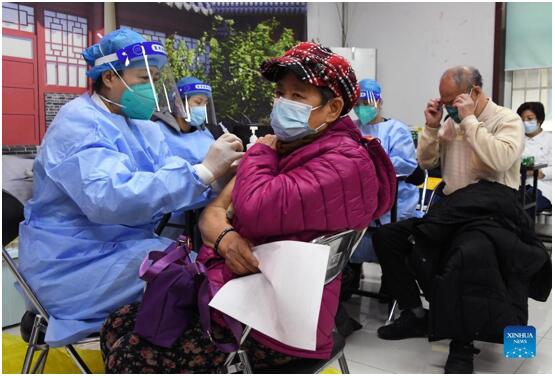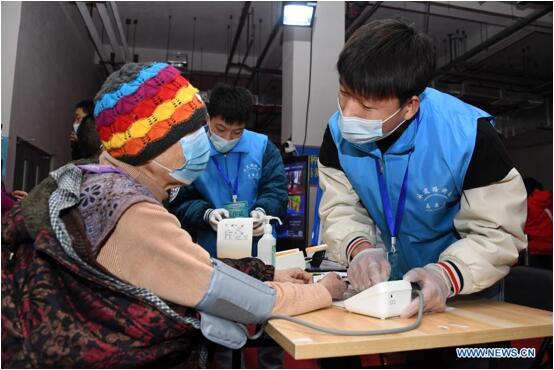The Chinese Center for Disease Control and Prevention answered frequently asked questions about COVID-19 vaccination among the elderly to better explain the importance of seniors getting vaccinated and to enhance the inoculation coverage. The following are some of the FAQs.
Q: Why are seniors recommended to actively get vaccinated against COVID-19?
A: Based on the analysis of data on infection, severe illness, and death from COVID-19 around the world, people aged above 60 are at higher risk for severe illness and death from COVID-19. The age group also demands the most medical resources during the epidemic because the elderly tend to need hospitalization and emergency treatment and have longer hospital stays. So it is of great importance to get seniors vaccinated against COVID-19.
According to World Health Organization recommendations, elderly persons or people with an underlying health condition are among the priority groups of vaccination in countries or regions with the epidemic.
Q: Some elderly people believe they do not need to get vaccinated because they live in remote areas, rarely go out or travel, and have a low risk of COVID-19 infection. Is this correct?
A: This idea is not correct. Due to the ease of transportation and the quick flow of people, no place is completely secluded from the virus. Some imported variants of the virus are highly contagious and some infections show atypical or even no symptoms. For the elderly who mostly stay at home or live in remote areas, there is still a possibility of getting infected. If they have family members who work or study at another location, the virus could be carried home and infect them. So it is advised that seniors get vaccinated as soon as possible to protect themselves as well as others.
Q: Is it necessary for seniors to get a booster shot and why?
A: Yes, it is necessary. Since seniors generally have a weaker immune function, people older than 60 generate a lower level of antibodies and have weaker protection than people aged 18-59 after completing routine vaccination. They also face a higher risk for severe illness and death after infection. Therefore seniors are recommended to get a booster shot six months after being fully vaccinated with inactivated or adenovirus vector vaccines for better protection against the disease.
There have been studies showing that the risk of severe disease and death after infection is reduced by more than 90 percent for seniors who have received booster shots.
Q: Should seniors choose to receive a booster shot developed with the same or different technology from those used in initial inoculations?
A: Either boosting with a dose that is the same as the initial inoculation or with a dose developed with a different technology is effective in lowering the risk of severe disease and death from COVID-19. Seniors can choose based on local vaccine supply.
Q: Under what conditions should seniors over 60 delay vaccination or not get vaccinated?
A: People over 60 should postpone the vaccination or not get vaccinated if they are allergic to any ingredients of the vaccine or have had an allergic reaction to the same type of vaccine;
they have had a severe allergic reaction to other vaccines;
they have uncontrolled epilepsy and other serious neurological diseases;
they are patients with fever or acute diseases, they are during acute attacks of chronic diseases, or they are patients with uncontrolled severe chronic diseases.
Q: Do seniors face additional risks or adverse effects after getting vaccinated?
A: Previous clinic trials showed the COVID-19 vaccines have good performance on safety and immune effects.
China has been closely monitoring the potential adverse effects following the immunization. Data shows recipients aged over 60 are slightly less likely to experience adverse effects after receiving a vaccine shot than those aged below 60.
Most elderly recipients aged over 60 reported common adverse effects. Severe adverse effects are very rare, which have been reported with a frequency of less than one in a million. So facing risks because of vaccination is very low.
Q: How can those who are unvaccinated due to health conditions better protect themselves against the disease?
A: Avoid going to places where crowds gather, or enclosed spaces, and reduce contact with strangers or people from other places.
Wear masks when having contact with strangers, going to indoor public places or taking public transportation.
Wash or disinfect your hands often and avoid touching your eyes, nose and mouth with your hands.
Keep your room well-ventilated.
Family members and caregivers who have contact with the elderly should get vaccinated and observe good personal protection.

An elderly man receives a COVID-19 vaccine shot at a vaccination site in Beijing's Haidian district, March 14, 2021. [Photo/Xinhua]

Medical workers administer booster shots of COVID-19 vaccines to local residents at a temporary vaccination site in Beijing, Nov 29, 2021. [Photo/Xinhua]

A resident has blood pressure taken before vaccination at Yongdinglu subdistrict of Haidian district in Beijing, March 14, 2021. [Photo/Xinhua]
chinadaily.com.cn | Updated: 2022-04-06 17:21


 Regulatory News
Regulatory News
 Position :
Position :